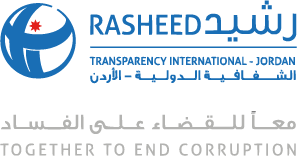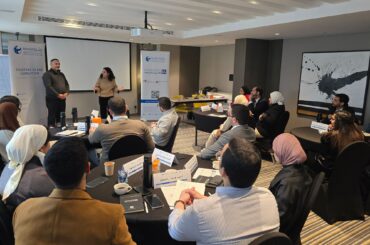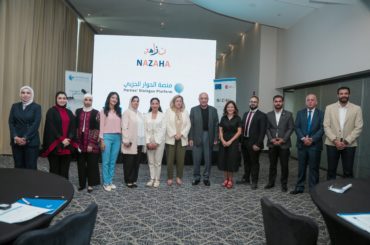- Jordan scored 47 out of 100, regressing 2 points compared to 2021.
- Jordan was rated 61 worldwide, regressing 3 places on the international rating.
- Jordan regressed on four resources out of eight resources namely:
World Competitiveness Yearbook, -5 degrees; –
– Political Risk Services International Country Risk Guide, -5 degrees;
– World Economic Forum EOS, -3 degrees;
– World Justice Project Rule of Law, -2 degrees.
- Jordan stayed stagnant on 4 resources: The Economist Intelligence Unit Country Ratings, Global Insight Country Risk Ratings, Varieties of Democracy, and Bertelsmann FDN Transformation Index.
- In the Arab world, Jordan came in 4th place after the United Arab Emirates, Qatar, and Saudi Arabia.
31st of January, 2023 – Amman.
Rasheed (Transparency International-Jordan), the national chapter of Transparency International, released today the results of the 2022 Corruption Perceptions Index (CPI), which was prepared by Transparency International (TI). The Corruption Perceptions Index ranks 180 countries and territories by their perceived levels of public sector corruption, according to economic experts and the business sector.
The Corruption Perceptions Index is a composite index, a combination of different international surveys and assessments of corruption, collected by a variety of reputable institutions to determine the degree of corruption in the public sector in 180 countries, by assigning a score ranging from 0-100, where 0 is highly corrupt and 100 the highest integrity level.
The Corruption Perceptions Index covers a range of topics of concern to the public interest, such as bribery, accountability and monitoring of how public funds are used, embezzlement of public funds, officials’ misuse of their positions for personal gain, the government’s ability to reduce corruption, and routine and bureaucratic procedures that contribute to increasing the chances of corruption, as well as nepotism and favoritism in public job appointments.
It also deals with the protection of whistle-blowers, journalists and investigators in the event they report cases of corruption, the ability of civil society to access information of public interest and the space for accountability available to citizens, in addition to the ability to access justice and the rule of law.
According to the results of the index for the year 2022,
In the Arab world, Jordan came in the 4th place after the United Arab Emirates scored 67 and Qatar 58, and Saudi Arabia 51, which are the highest scores on the index compared to the rest of the Arab countries, while Yemen scored 16, Syria 13 and Somalia 12 which are the lowest scores on the index.
Globally, Denmark scored 90, Finland and New Zealand scored 87, followed by Norway 84, and Singapore and Sweden scored 83. These countries participated in the consolidation of human rights in terms of legislation and practices through gender equality and social justice and invested more than others in healthcare as they practiced democracy and the rule of law, secured freedom of opinion and expression, and made information available to ensure the participation of citizens in decision-making and to enhance the role of civil society organizations in services, and oversight.
Jordan regressed on 4 indicators this year that measure mostly to what extent does the government succeed in reducing corruption in various government institutions, in addition to the extent of bribery, nepotism, and favoritism, as well as holding public officials positions for a long time and abusing the public finances for personal gains.
Transparency International, stressed on the connection between the rise of conflict and the lack of transparency, since Corruption can undermine political, social, and economic stability, and ultimately threaten peace, safety, and security as a whole. And that corruption also creates a fertile ground for organized criminal activities, even terrorism, as criminals are aided in their illegal activities by the complicity of corrupt public officials. Resilience scores represent the political, legal, economic, and social spheres of society that when taken together, have the potential to provide holistic and effective responses to organized crime. The higher the resilience score, the more effective the response to organized crime.
According to the Chair of Transparency International, Delia Ferrera, “Corruption has made our world a more dangerous place. As governments have collectively failed to make progress against it, they fuel the current rise in violence and conflict – and endanger people everywhere. The only way out is for states to do the hard work, rooting out corruption at all levels to ensure governments work for all people, not just an elite few.”
Daniel Erikson, the Chief Executive Officer of Transparency International said: “Leaders can fight corruption and promote peace all at once. Governments must open up space to include the public in decision-making – from activists and business owners to marginalized communities and young people. In democratic societies, the people can raise their voices to help root out corruption and demand a safer world for us all.”
Based on the results of the Corruption Perceptions Index (CPI), “Rasheed” recommends the following:
- The commitment of the Government to include the fight against corruption in its priorities, enhance the culture of Integrity, transparency, accountability, the rule of law and the participatory approach, and to adopt a holistic national integrity system in all sectors, as well as enhance social justice and equal opportunities.
- Strengthen the role of supervisory bodies and institutions like the Jordan Integrity and Anti-Corruption Commission and the Audit Bureau and others, and enhance the administrative and financial independence necessary for them to perform their duties, strengthen their ability to develop creative and efficient tools to fight corruption, as well as including all sectors that receive funds from the public budget under their supervision.
- Complete the harmonization of all legislations to comply with the United Nations Convention against Corruption and bilateral agreements.
- Make the results of the follow-up committee on the recommendations of the annual report of the Audit Bureau publicly available.
- Inclusion of special funds and donations (Local and international) allocated to combat the Corona pandemic under the supervision of the Audit Bureau.
- Ensure disclosure of actual beneficial ownership and transparent contracting to combat abuse and conflict of interest.
- Establish transparent central records for foreign companies that bid on public contracts and purchase real estate.
- Ensure the right of access to information and proactive disclosure of information to the public in a clear and accessible manner electronically to enhance public accountability.
- Adopt an inclusive approach in the planning of the public budget as well as publishing data on public spending and the distribution of resources in general, and in cases of emergencies and crises in particular, timely and in a simplified and clear way, in order to enhance trust between the citizen and the government.
- Disclose the financial declarations of government officials in higher positions, the Parliamentarians, the members of the pandemic committees, as well as the members of the financial committees and the approval for foreign funding committee, and update the information annually.
- lift restrictions on human rights, including freedom of opinion and expression and the right to assembly, including the civic space, and provide a clear legislative system that regulates the work and independence of civil society organizations on the one hand, ensuring subsequent oversight as well as governance of the related public sector committees and institutions related to their work, and lift arbitrary restrictions and practices on civil society organizations. Hence, enhance citizens’ accountability and the trust between the citizens and the government.
- Publish periodically the corrective measures that had been taken in response to the Audit Bureau remarks on violation.
- Secure open channels of communication between the citizens and the government.
- Include all funds and donations of the pandemic under the Audit Bureau.
- Strengthen the protection of whistle-blowers, encourage reporting, and support corruption victims.
- Hold the law enforcement entities accountable for any by the personnel and take legal measures against transgressors.
- Ensure the digital transformation of all government procedures and communication.
- Include incentives for corruption reporting to the public sector employees.
- Raise awareness in the public sector of the importance of adhering to the code of conduct.
- Monitor the revolving doors, meaning the movement of individuals between positions of public office and jobs in the same sector in the private or voluntary sector, in either direction. And adopting a suitable cooling-off period as a minimum time required between switching from the public to the private sector, and enhancing measures that prohibit their occurrence.
- Adopt more transparency in the appointment in the public sector and the criterion of appointment.
- Prosecute all corrupt, without exception, and ensuring that they receive fair trials.
Rasheed for Integrity and Transparency (Transparency International – Jordan) is a non-profit civil society organization, established end of 2013, and is the only national branch of Transparency International in Jordan. It aims to strengthen the pillars of good governance based on transparency, integrity, accountability, and the rule of law, raise the level of integrity and combat corruption in the public and private sector, and enhance the awareness of individuals from various sectors of the importance of transparency, accountability and reporting on corruption, in addition to strengthening the legal and executive frameworks of the national integrity system, through communication cooperating and exchanging experiences with international, regional and national organizations and working to expand the circle of data and information available to citizens.




